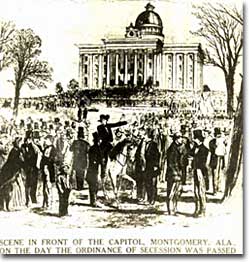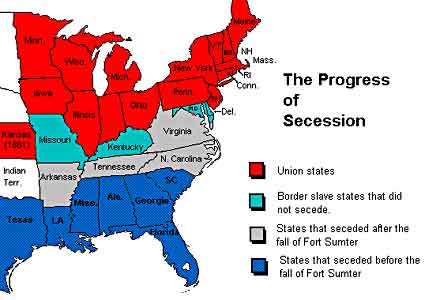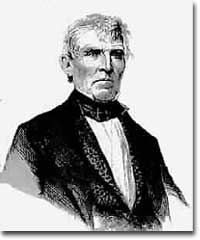what was the first state to secede from the union in 1860

32e. The South Secedes

Crowds gathered in front of the Capitol building in Montgomery, Alabama, the day that the secession neb was passed.
The forcefulness of events moved very apace upon the ballot of Lincoln. Due south Carolina acted kickoff, calling for a convention to secede from the Wedlock. State by country, conventions were held, and the Confederacy was formed.
Within three months of Lincoln'due south election, seven states had seceded from the Union. Just equally Springfield, Illinois historic the election of its favorite son to the Presidency on November 7, so did Charleston, South Carolina, which did non bandage a single vote for him. It knew that the election meant the germination of a new nation. The Charleston Mercury said, "The tea has been thrown overboard, the revolution of 1860 has been initiated."
South Carolina Ordinance of Secession
![]() Nosotros, the people of the State of Southward Carolina, in convention assembled, exercise declare and ordain, and it is hereby alleged and ordained, That the ordinance adopted by u.s.a. in convention on the twenty-tertiary mean solar day of May, in the year of our Lord thou 7 hundred and fourscore-8, whereby the Constitution of the United States of America was ratified, and also all acts and parts of acts of the Full general Associates of this State ratifying amendments of the said Constitution, are hereby repealed; and that the union now subsisting between Southward Carolina and other States, nether the proper name of the "United states," is hereby dissolved.
Nosotros, the people of the State of Southward Carolina, in convention assembled, exercise declare and ordain, and it is hereby alleged and ordained, That the ordinance adopted by u.s.a. in convention on the twenty-tertiary mean solar day of May, in the year of our Lord thou 7 hundred and fourscore-8, whereby the Constitution of the United States of America was ratified, and also all acts and parts of acts of the Full general Associates of this State ratifying amendments of the said Constitution, are hereby repealed; and that the union now subsisting between Southward Carolina and other States, nether the proper name of the "United states," is hereby dissolved.![]()
Washed at Charleston the twentieth day of December, in the year of our Lord yard viii hundred and lx.

This map shows the states that seceded from the Marriage before the fall of Fort Sumter, those that seceded afterwards, the slave states that did non secede, and the Union states.
Inside a few days, the two United states of america Senators from South Carolina submitted their resignations. On December 20, 1860, by a vote of 169-0, the South Carolina legislature enacted an "ordinance" that "the matrimony at present subsisting between South Carolina and other States, under the name of 'The United States of America,' is hereby dissolved." As Gist had hoped, South Carolina'south activity resulted in conventions in other southern states. Mississippi, Florida, Alabama, Georgia, Louisiana, and Texas all left the Union by February 1. On February iv, delegates from all these states except Texas met in Montgomery, Alabama, to create and staff a regime called the Amalgamated States of America. They elected President Jefferson Davis. The gauntlet was thrown. How would the North respond?

Senator Crittenden'due south two sons went on to serve as generals on opposite sides of the Civil War.
A few last ditch efforts were fabricated to terminate the crisis through Constitutional amendment. Senator John Jordan Crittenden proposed to amend the Constitution to extend the old 36°xxx' line to the Pacific. All territory North of the line would exist forever complimentary, and all territory south of the line would receive federal protection for slavery. Republicans refused to support this measure.
On March two, 1861, two days before Lincoln'south inauguration, the 36th Congress passed the Corwin Amendment and submitted it to usa for ratification equally an amendment to the Constitution. Senator William H. Seward of New York introduced the amendment in the Senate and Representative Thomas Corwin of Ohio introduced it in the House of Representatives. The text of the proposed amendment is as follows:
"No amendment shall be made to the Constitution which will qualify or give to Congress the power to abolish or interfere, inside any Country, with the domestic institutions thereof, including that of persons held to labor or service past the laws of said State."
Note that, much like the remainder of the language in the Constitution prior to the Ceremonious State of war, the proposed amendment never uses the word "slavery," instead employing the euphemisms "domestic institutions" and "persons held to labor or service." The proposed amendment was designed to reassure the seceding slave states that the federal regime would not interfere with their "peculiar institution." If it had passed, it would accept rendered unconstitutional any subsequent amendments restricting slavery, such as the 13th Amendment, which outlawed slavery throughout the nation. The Corwin Subpoena passed the country legislatures in Ohio, Kentucky, Rhode Isle and Maryland. Even Lincoln's own land of Illinois passed it, though the lawmakers who voted for it in Illinois were not actually the elected legislators just were delegates to a state constitutional convention.
Lincoln supported the Amendment, specifically mentioning it in his first inaugural address:
"I understand a proposed subpoena to the Constitution — which amendment, all the same, I have not seen — has passed Congress, to the effect that the Federal Government shall never interfere with the domestic institutions of u.s., including that of persons held to service ... holding such a provision to at present exist implied constitutional law, I have no objection to its being made express and irrevocable. "
The subpoena failed to become the required approval of 3/4 of all land legislatures for a Constitutional Amendment, largely because many of the southern slave states had already seceded and did not vote on it.
What was the President doing during all this furor? Abraham Lincoln would non be inaugurated until March 4. James Buchanan presided over the exodus from the Marriage. Although he thought secession to be illegal, he found using the army in this instance to be unconstitutional. Both regions awaited the arrival of President Lincoln and wondered anxiously what he would do.
Source: https://www.ushistory.org/us/32e.asp
Post a Comment for "what was the first state to secede from the union in 1860"